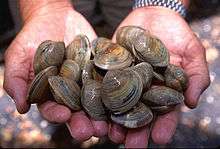Definify.com
Webster 1913 Edition
Clam
Clam
Clam
,Clam
,Clam
,Clam
,Webster 1828 Edition
Clam
CLAM
,Definition 2025
clam
clam
English

Noun
clam (plural clams)
- A bivalve mollusk of many kinds, especially those that are edible; as, the long clam (Mya arenaria), the quahog or round clam (Venus mercenaria), the sea clam or hen clam (Spisula solidissima), and other species of the United States. The name is said to have been given originally to the Tridacna gigas, a huge East Indian bivalve.
- 1913, Joseph C. Lincoln, chapter 3, in Mr. Pratt's Patients:
- My hopes wa'n't disappointed. I never saw clams thicker than they was along them inshore flats. I filled my dreener in no time, and then it come to me that 'twouldn't be a bad idee to get a lot more, take 'em with me to Wellmouth, and peddle 'em out. Clams was fairly scarce over that side of the bay and ought to fetch a fair price.
-
- Strong pincers or forceps.
- A kind of vise, usually of wood.
- (US, slang) A dollar (usually used in the plural).
- Those sneakers cost me fifty clams!
- (slang, derogatory) A Scientologist.
- 1998 February 23, jesparolini, “CO$ Celebrities: USEFUL IDIOTS”, in alt.religion.scientology, Usenet:
- So the clams have John Travolta, Tom Cruise, et al in their hot li'l ol'P-R hands […]
-
Translations
|
|
Verb
clam (third-person singular simple present clams, present participle clamming, simple past and past participle clammed)
Translations
|
Derived terms
See also
Etymology 2
Noun
clam (plural clams)
- A crash or clangor made by ringing all the bells of a chime at once.
- (Can we find and add a quotation of Nares to this entry?)
Verb
clam (third-person singular simple present clams, present participle clamming, simple past and past participle clammed)
- To produce, in bellringing, a clam or clangor; to cause to clang.
- (Can we find and add a quotation of Nares to this entry?)
Etymology 3
From Middle English clammen (“to smear, bedaub”), from Old English clǣman (“to smear, bedaub”). Compare German klamm (“clammy”). The sense of "sticky; to stick" came from a conflation of clemen (“to bedaub, plug a hole with something sticky (as clay or pitch); to stick”) (which was derived from Old Norse kleima) and clammen (“to smear, bedaub”) (which derives from Old English clæman) in the Middle English period. See also clammy (“damp, cold and sticky”) and clem (“to adhere, stick, plug (a hole)”).
Adjective
clam (comparative clammer, superlative clammest)
- (obsolete) clammy.
Noun
clam
- clamminess; moisture
- Carlyle
- The clam of death.
- Carlyle
Verb
clam (third-person singular simple present clams, present participle clamming, simple past and past participle clammed)
- To be moist or glutinous; to stick; to adhere.
- (Can we find and add a quotation of Dryden to this entry?)
- To clog, as with glutinous or viscous matter.
- L'Estrange
- A swarm of wasps got into a honey pot, and there they cloyed and clammed themselves till there was no getting out again.
- L'Estrange
Anagrams
Latin
Etymology
From Proto-Indo-European *ḱl-, zero-grade form of *ḱel- (“to hide, conceal”). Cognate to Latin cēlō.
Pronunciation
- (Classical) IPA(key): /klam/, [kɫã]
- (Ecclesiastical) IPA(key): /klam/
Adverb
clam (not comparable)
Preposition
clam
- (with accusative or, rarely, ablative) without the knowledge of, unknown to
- 163 B.C.E. Terence, Heauton Timorumenos, Act II, Scene II:
- Neque adeo clam me est.
- Nor indeed is it unknown to me.
- Neque adeo clam me est.
- 163 B.C.E. Terence, Heauton Timorumenos, Act II, Scene II:
Derived terms
- clanculō
- clanculum
Related terms
- clanculārius
- clandestīnō
- clandestīnus
References
- clam in Charlton T. Lewis and Charles Short (1879) A Latin Dictionary, Oxford: Clarendon Press
- clam in Charlton T. Lewis (1891) An Elementary Latin Dictionary, New York: Harper & Brothers
- CLAM in Charles du Fresne du Cange’s Glossarium Mediæ et Infimæ Latinitatis (augmented edition, 1883–1887)
- Félix Gaffiot (1934), “clam”, in Dictionnaire Illustré Latin-Français, Paris: Hachette.